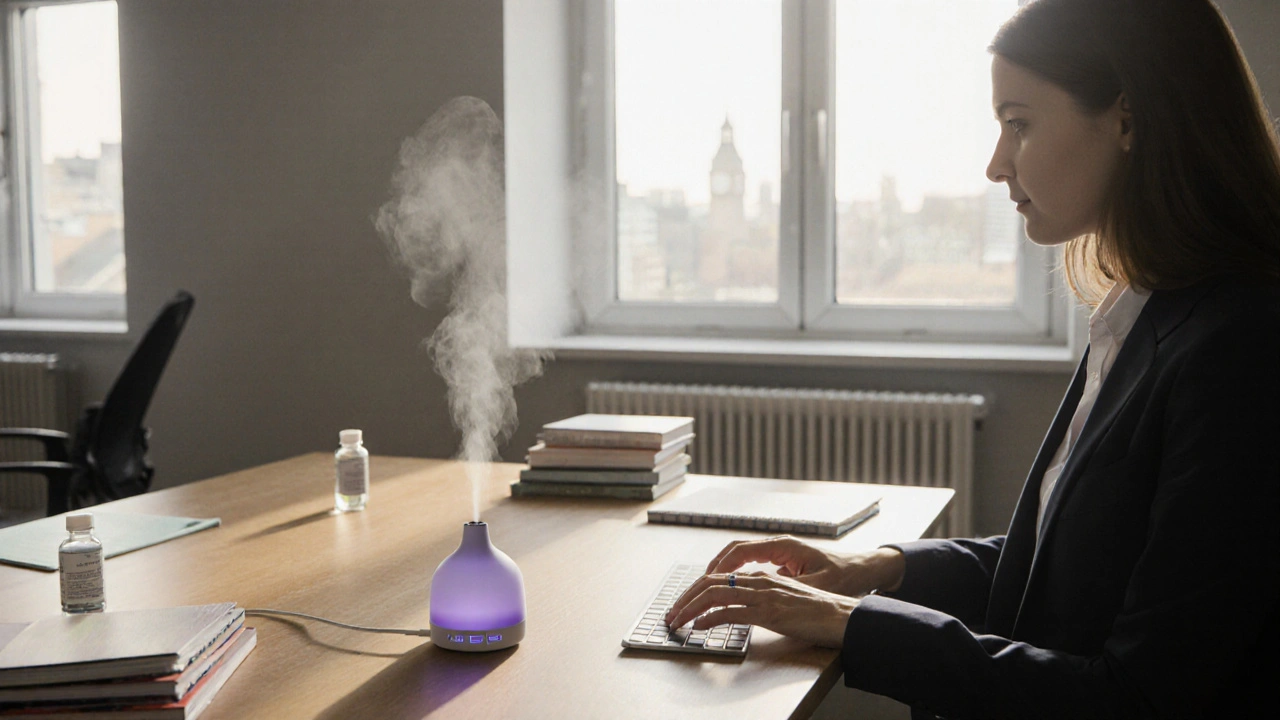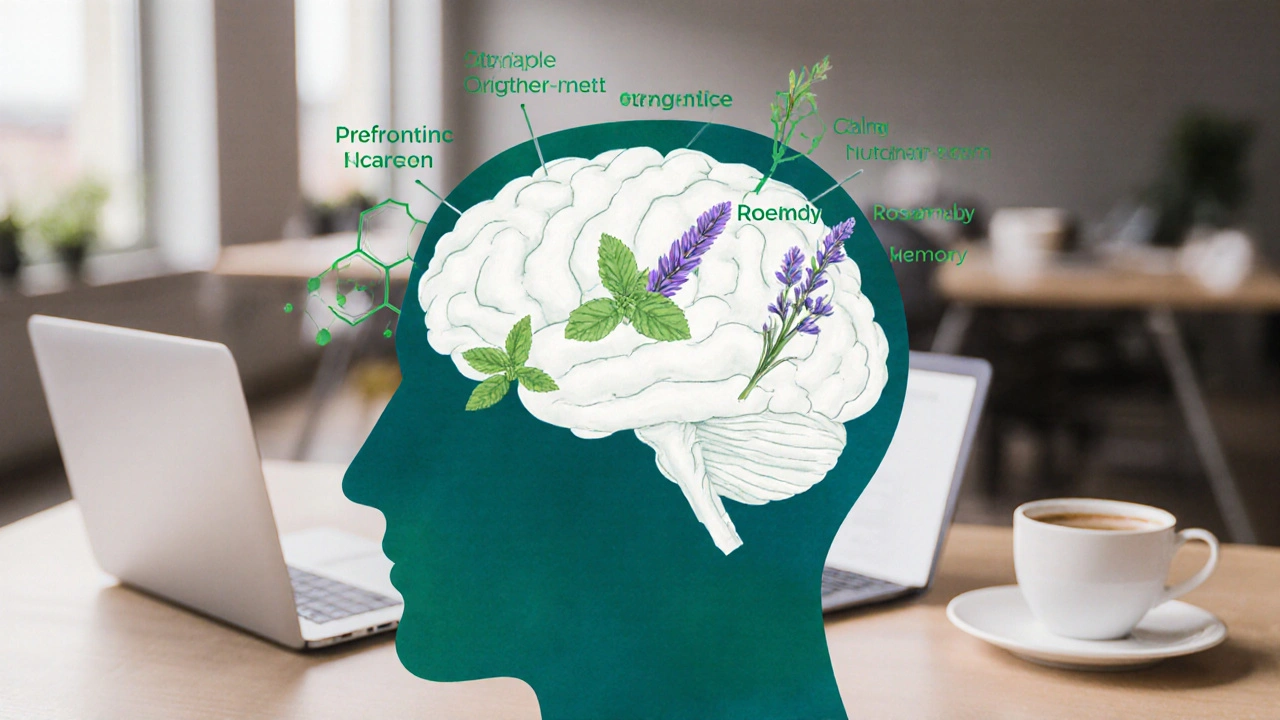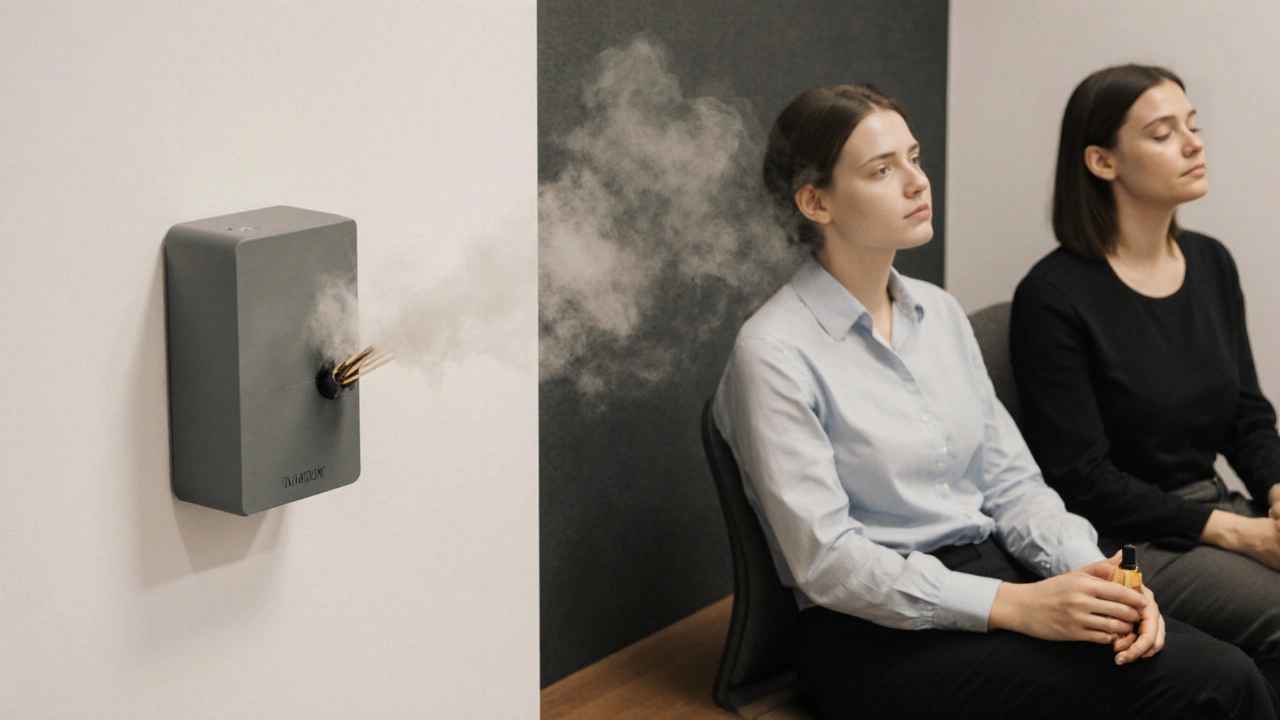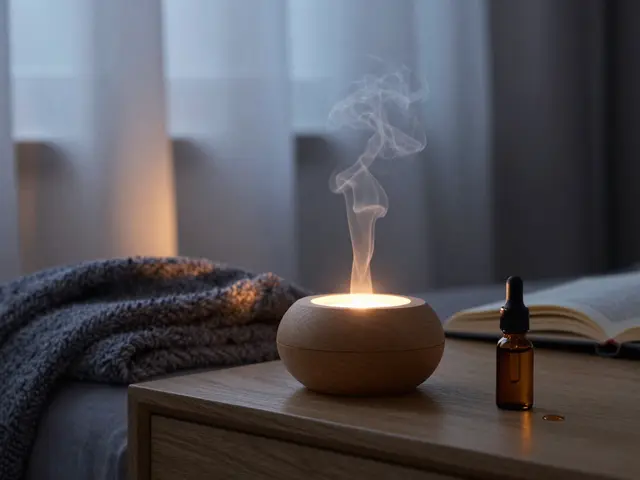How Aromatherapy Boosts Workplace Productivity

Workplace Aromatherapy Selector
Find Your Perfect Aromatherapy Match
Select your work situation to get personalized recommendations for essential oils that boost productivity and reduce stress.
Ever walked into an office and instantly felt calmer? Maybe it was the faint scent of citrus in the air, or the quiet woody note of lavender drifting from a desk diffuser. It’s not just in your head-aromatherapy is quietly reshaping how people work, especially in high-pressure environments. Companies from tech startups in Seattle to design studios in Melbourne are using essential oils not as a luxury, but as a practical tool to reduce stress, sharpen focus, and cut down on burnout.
What Aromatherapy Actually Does to Your Brain
Aromatherapy isn’t magic. It’s science with a scent. When you inhale essential oil molecules, they travel straight to your limbic system-the part of your brain that handles emotions, memory, and stress responses. Unlike pills or supplements, essential oils don’t need to be digested. They work fast. A 2024 study from the University of Western Australia tracked 120 office workers using lavender and peppermint diffusers for four weeks. Those using peppermint saw a 15% increase in task accuracy. Lavender users reported 23% lower self-rated stress levels. Neither group took medication. They just breathed.
Peppermint oil, for example, stimulates the prefrontal cortex-the area responsible for decision-making and attention. That’s why it’s common in call centers and data entry teams. Citrus oils like lemon and orange trigger serotonin release, lifting mood without caffeine’s crash. Rosemary has been shown in lab tests to improve memory recall by up to 70% in short-term tasks. These aren’t vague claims. They’re measurable results from controlled trials.
Real Offices, Real Results
In Perth, a mid-sized accounting firm switched from air fresheners to a custom blend of bergamot and eucalyptus in their open-plan workspace. Within six weeks, employee absenteeism dropped by 31%. The HR manager didn’t see it as a wellness perk-she called it a productivity upgrade. Same thing happened at a Sydney-based software company. They introduced 10-minute ‘scent breaks’ where staff could step into a quiet room with a diffuser of frankincense and clary sage. Teams reported fewer mental blocks during brainstorming sessions. Managers noticed fewer arguments in Slack channels.
It’s not just about feeling good. It’s about reducing cognitive load. When stress spikes, your brain uses more energy just to stay calm. That leaves less bandwidth for actual work. Aromatherapy helps reset that baseline. One employee at a London marketing agency told me: ‘I used to need three coffees and a walk around the block just to start writing. Now I just turn on the diffuser. I’m typing within five minutes.’
Which Scents Work Best for What Tasks
Not all oils are created equal. Different scents serve different functions. Here’s what actually works based on workplace needs:
- Peppermint - Best for repetitive tasks, data entry, coding. Enhances alertness and reduces errors.
- Lavender - Ideal for high-stress roles like customer service, nursing, or finance. Lowers heart rate and cortisol.
- Lemon - Great for morning meetings or creative work. Clears mental fog and boosts motivation.
- Rosemary - Helps with memory-heavy tasks like legal research or accounting audits.
- Bergamot - A natural mood lifter. Perfect for teams dealing with tight deadlines or client complaints.
- Frankincense - Slows breathing, encourages deep focus. Used by teams doing long-form writing or design work.
Blends matter too. A mix of lavender and orange reduces anxiety better than either alone. Peppermint and rosemary together improve mental stamina for 90-minute work sprints. Most companies start with one or two oils and adjust based on feedback.

How to Introduce Aromatherapy Without Making It Weird
Some people think essential oils are for yoga studios, not boardrooms. That’s a misconception. The key is subtlety. You don’t need a room full of mist or a giant diffuser on every desk. Most successful workplace programs use:
- Personal diffusers on desks (USB-powered, quiet, under $40)
- Wall-mounted units in common areas like break rooms or meeting rooms
- Rollerballs for employees to apply to wrists before meetings
- One-hour ‘scent sessions’ before major deadlines or after lunch slumps
Rules help. No strong scents during client calls. No spraying directly on others. Always offer alternatives-some people have migraines or allergies. A 2023 survey by the International Journal of Workplace Health Management found that 89% of employees supported scent programs, as long as they were optional and low-intensity.
Start small. Try one oil in the break room for two weeks. Ask staff to fill out a quick form: ‘Did you feel more focused today?’ No pressure. Just data. Most teams end up asking for more.
What Doesn’t Work (And Why)
Not every oil helps. Some can even hurt productivity. Avoid:
- Heavy florals like jasmine or ylang-ylang-they can be overwhelming and trigger headaches.
- Strong menthol blends-too intense for enclosed spaces.
- Unpurified oils from Amazon or discount stores-they often contain fillers that irritate airways.
- Overuse-diffusing for 12 hours straight leads to olfactory fatigue. Your nose stops noticing. Use timers. 15-30 minutes every 2-3 hours is ideal.
Quality matters. Look for oils labeled ‘100% pure,’ ‘therapeutic grade,’ or certified by GC/MS testing. Brands like doTERRA, Plant Therapy, and Eden’s Garden are commonly trusted in corporate settings. Don’t buy based on price. Cheap oils are often diluted with synthetic fragrances that do nothing but irritate.

Who Benefits the Most
Aromatherapy doesn’t help everyone equally. It works best for people in roles with:
- High cognitive load (accountants, lawyers, analysts)
- Emotional labor (HR, customer support, healthcare)
- Repetitive tasks (data entry, call centers, warehouse sorting)
- Long screen hours (designers, developers, writers)
It’s less effective for manual labor or outdoor roles. But even warehouse teams using citrus scents during shift changes reported fewer complaints about fatigue. The key is matching the scent to the task and the environment.
Cost vs. Return
Let’s say you buy a good-quality diffuser for $60 and 5 bottles of essential oils at $25 each. That’s $185 upfront. You’re probably thinking: ‘Is this worth it?’
Consider this: The average U.S. company loses $3,400 per employee per year due to stress-related absenteeism and reduced output (CDC, 2024). In Australia, that number is similar. If aromatherapy reduces absenteeism by just 10% and boosts focus by 12%, you’re saving far more than the cost of oils. One tech firm in Brisbane calculated a 4:1 return on investment within four months-just from fewer sick days and faster project turnarounds.
This isn’t a spa trend. It’s a low-cost, high-impact tool.
Getting Started Today
You don’t need a corporate budget to try this. Here’s how to begin:
- Choose one oil that matches your biggest challenge: stress? Try lavender. Brain fog? Try lemon or peppermint.
- Get a small USB diffuser (under $30) or a personal inhaler ($15).
- Use it for 15 minutes during your morning routine or before a tough meeting.
- Track how you feel for a week. Write down one thing: Did you start tasks faster? Did you feel calmer under pressure?
- Share your results with your team. If it works for you, others will ask.
There’s no magic formula. But there’s a lot of evidence. Aromatherapy isn’t about replacing sleep, exercise, or good management. It’s about removing one small barrier to focus. And sometimes, that’s all it takes to turn a bad day into a productive one.
Can aromatherapy really improve focus at work?
Yes. Studies show that certain essential oils like peppermint and rosemary can improve attention span and task accuracy by up to 15-70%, depending on the task. These effects are linked to how scent molecules directly stimulate brain regions responsible for memory and alertness. Unlike caffeine, they don’t cause jitters or crashes.
Which essential oils are best for reducing workplace stress?
Lavender is the most researched for stress reduction, lowering cortisol levels and heart rate. Bergamot and frankincense also show strong calming effects without drowsiness. These are commonly used in high-pressure environments like hospitals, call centers, and legal offices. Always use 100% pure oils-synthetic fragrances won’t work and may irritate.
Is aromatherapy safe in shared office spaces?
Yes, if done thoughtfully. Use low-output diffusers, avoid spraying directly, and never force scents on others. Offer alternatives for people with sensitivities. Most successful programs are optional and subtle. A 2023 study found 89% of employees supported scent programs when they were voluntary and not overpowering.
How long does it take to see results from aromatherapy at work?
Many people notice a difference within the first few days-especially with stress or mental fog. For measurable changes like fewer sick days or faster task completion, it usually takes 2-4 weeks of consistent use. The key is regular, not excessive, exposure. Use oils for 15-30 minutes at a time, 1-3 times per day.
Can I use aromatherapy if I have allergies?
If you have respiratory allergies or asthma, test oils cautiously. Start with a small amount in a well-ventilated space. Some oils, like eucalyptus or peppermint, can trigger reactions in sensitive individuals. Opt for hypoallergenic brands and avoid synthetic fragrances. If in doubt, use rollerballs applied to wrists instead of diffusers.
Do I need expensive oils to get results?
No, but quality matters. Cheap oils are often cut with alcohol or synthetic additives that don’t have therapeutic effects and can cause headaches. Look for labels that say ‘100% pure essential oil’ and check for GC/MS testing reports. Brands like Plant Therapy and Eden’s Garden offer affordable, reliable options. You don’t need luxury brands-just honest ones.





